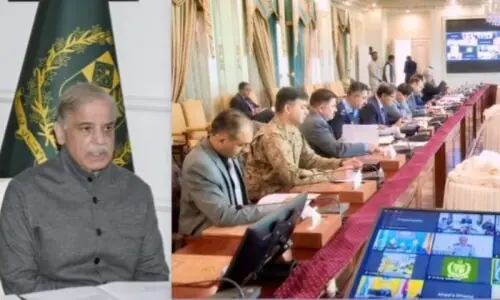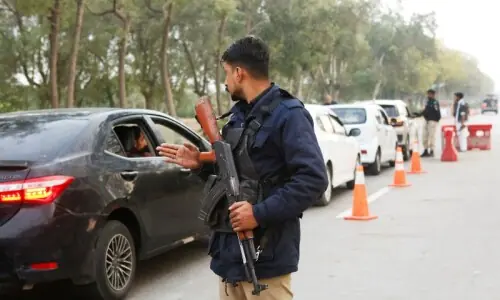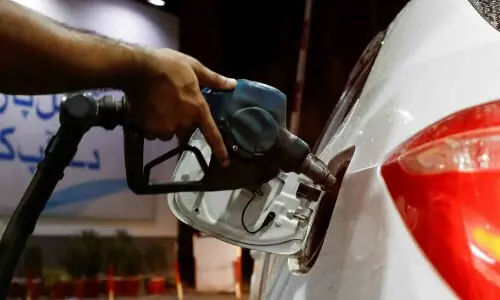
ISLAMABAD: The Supreme Court on Friday dealt a severe blow to the policies of the previous as well as present governments on rental power projects when in an overarching verdict it held the RPP contracts non-transparent and ordered that these to be rescinded.
The court also ordered National Accountability Bureau chairman Admiral (retd) Fasih Bokhari to proceed with corruption references against those who were at the helm of affairs when the contracts were signed between 2006 and 2008 to overcome the energy shortfall through RPPs as a stopgap arrangement.
The unlucky ones who will face criminal charges include former water and power ministers Liaquat Jatoi and Raja Pervez Ashraf as well as Finance Minister Naveed Qamar and Finance Secretary Waqar Masood. During their tenures, down payment to different RPPs was increased from seven to 14 per cent.
The court issued the order after hearing applications moved by PML-Q legislator and Housing Minister Fasial Saleh Hayat and PML-N stalwart Khwaja Asif alleging corruption and mismanagement in RPP deals.
Authored by Chief Justice Iftikhar Mohammad Chaudhry, the 90-page verdict could have a sobering effect on the performance of the government because it characterised failure on the part of the federal government as well as Water and Power Development Authority (Wapda), Pakistan Electric Power Company (Pepco) and generation companies (Gencos).
“Similarly, the functionaries of Pepco, Gencos, Pakistan Power Infrastructure Board (PPIB) and National Electric Power Regulatory Authority (Nepra), along with sponsors (successful bidders) who derived financial benefits from the RPP contracts, are prima facie involved in corruption and corrupt practices. Therefore, they are also liable for both civil and criminal action,” the order said. The NAB chairman was asked to submit fortnightly reports on progress on the matter to the court registrar, to be seen by judges in their chambers. The judgment also scolded Nepra and said that in terms of the Constitution and Power Act of 1997 it had been mandated to safeguard interests of consumers, but it failed to perform its duty diligently. “It is a constitutional requirement that every action of the government authorities should be aimed at socioeconomic development of the country.”
The verdict held that all RPP contracts -- solicited and unsolicited signed off or operational, right from 220MW Bhikki Sheikhupura and 136MW Sharaqpur up to Piranghaib and Naudero-I and II were entered into in contravention of PPRA rules. Besides suffering from other irregularities, the contracts also violated the principle of transparency and fair and open competition.
“Therefore, the same are declared to be non-transparent, illegal and void ab initio. Consequently, the RPP contracts are ordered to be rescinded forthwith and all persons responsible for the same are liable to be dealt with for civil and criminal action in accordance with the law,” the judgment said.
Accepting an earlier report of the Asian Development Bank (ADB), the court regretted that nine of the 19 RPPs were allowed to operate.
Subsequently, six of the nine RPPs were discontinued either having been signed off or having failed to achieve the COD (commercial operation date) target. The remaining RPPs -- Karkey, Naudero-I and Gulf Power Plant -- are functioning, but they are producing electricity much less than their generation capacity, except Gulf Power which is producing electricity close to the agreed capacity.
RPP Piranghaib in Multan has not generated electricity at all and down payment made to it has not been returned. Although RPP Reshma achieved partial COD, it was not accepted by Nepra. Bhikki and Sharaqpur were paid exorbitant rentals in billions of rupees, but their generation was much below the agreed capacity.
The verdict said the finance ministry, Wapda and Gencos were responsible for causing huge losses to the public exchequer which ran into billions of rupees by making seven to 14 per cent down payment and purchasing electricity at higher rates from RPPs.
Therefore, it said, steps should be taken to recover the amount with mark-up outstanding against the RPPs whose contracts had been signed off or which had failed to achieve the COD within the stipulated time in terms of the performance guarantees.
“The Supreme Court has made yet another attempt to block the floodgates of corruption by this government,” Khwaja Asif commented immediately after the verdict had been announced. Appreciating the verdict, Khwaja Asif alleged that Prime Minister Yousuf Raza Gilani was directly responsible for the crime because the projects were approved by the ECC meeting chaired by him.
Shaukat Ali, acting as a spokesperson for Raja Pervez Ashraf, also welcomed the judgment, but recalled that the former minister had always raised the matter in parliament, apex court and the media and demanded an investigation to ensure transparency.





























